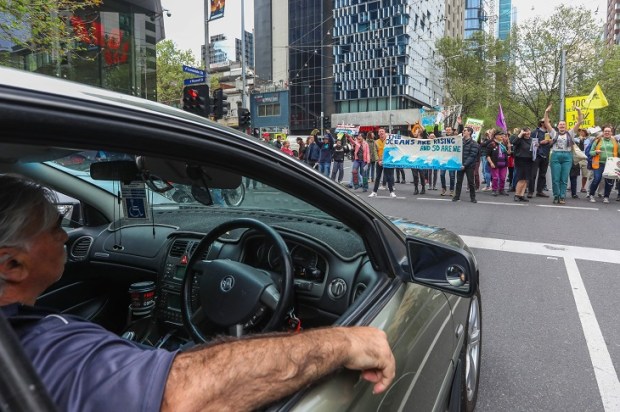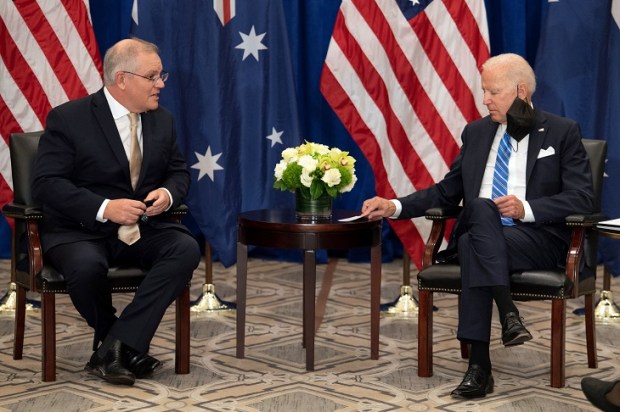According to the common narrative, the spectre of rightist authoritarianism has haunted the West since 2016. For as is usually understood, Brexit and the emergence of Donald Trump, Marine Le Pen, and their ilk was a portent of a dark anti-democratic future to come. Their vanquishing thus saved us from fascism and the inevitable return of you know who.
Be this as it all may, American writer Scott Greer informs us that such a notion suffers a crucial deficit. It’s a delusion: a fantasy not based upon any observable reality. There may be a renewed authoritarianism, however; but as Greer notes, if so, such a trend will almost certainly come from the Left.
As Greer observes of America, there may be two leftist tyrannies lying in wait. The first is a continuation of the soft despotism of the left-liberal order. In essence, no real upheaval, just more of the same: even more Pride parades, a greater focus on minority rights, and continued repression of what remains of the Right. As Greer wryly remarks: ‘More people would be arrested over memes, but much would remain the same.’
The second and more serious is a far-left populism in the mould of ex-Venezuelan President Hugo Chavez. This ‘American Chavism’ would upend the political and economic order and radically reform American life. In essence, it would be a radical form of socio-cultural Marxism based around wealth redistribution fuelled by ethnic animus.
At its core would be the redistribution of funds from the Anglo-European majority – i.e. ‘white America’ – to assorted American minorities. Reparations would be paid of course. Yet not only to African Americans, but to the many other minorities found across the United States. As Greer predicts: ‘Hispanics [would] deserve reparations for immigration enforcement, Indians for European settlement, Asians for colonialism, etc.’
An American Chavism would expand the logic of reparations and ‘make it more inclusive, yet equally anti-white.’ In practice, it would mean socialist economics melded to an ‘anti-white’ cultural agenda in a movement that would unite the multiracial working class against the historic majority. Ultimately, it would be ‘the realisation of multicultural America’.
A fantasy, surely? Not necessarily. As Greer notes, most of the ingredients for this mix are already there. Economically, there’s a vast pool of low-paid service workers who feel excluded from the American Dream. While demographically, America’s growing diversity means that there’s an ever-expanding constituency receptive to such an idea. Claims that are strengthened by the fact that a majority of Democrats now support reparations and in the ever-increasing numbers of identitarian groups like The Squad.
Such a movement also has its antecedents and epigones in other parts of the world – especially Latin America. For as ‘American Chavism’ alludes, similar forms of demagogic socialism have a profound history south of the Rio Grande: think Fidel Castro, Che Guevara, or Salvador Allende.
Yet Chavez is perhaps the most egregious recent exemplar. For the unfamiliar, Chavez, a humble pies descalzo of Afro-Latino and Amerindian origin, ran his oil-rich nation into the ground through his ham-handed redirection of the wealth and influence of Venezuela’s traditional Euro-Spanish elite to its benighted indigenous masses.
As Greer notes, ‘Chavez vowed to end the dominance of Venezuela’s white castizo elite and distributed their wealth to the nation’s indios, blacks, and mestizos’. Something that his predecessor Nicolas Maduro has continued to full effect as he’s transformed Venezuela into a ‘tyrannical dump’.
A scenario that is echoed to varying degrees across the continent. In Bolivia, for example, ex-President Evo Morales oversaw a semi-socialist regime that was avowedly pro-Amerindian. Something now seen to a lesser extent in Brazil, with the return of Lula, as well as in the left-leaning governments of Chile and Colombia. Indeed, this particular mezcla of Marxism and ethnic animosity is something of which many outsiders are unaware, but that has permeated Latin America for its entire five centuries.
Moving home, is this at all foreseeable in Australia? Yes and no. To take the negative first, there are certainly differences that make such a trend less likely. Our high minimum wage means we don’t have the vast disparities in wealth nor the large urban underclass seen in the Americas. Our differing histories also mean we lack an Original Sin and the shadow this casts across almost every aspect of American life. While compulsory voting, constitutional monarchy, and the assorted checks and balances of our political system further render this unlikely.
Yet this is not to say we’re immune. Indeed, we’re already manifesting many of the same errors. Economically, we have a similar army of low-skilled workers spread across the gig economy. We are further witness to rising inequality and a stagnant per-capita GDP – something worsened by the Albanese government’s record immigration intake. And we also have a generation that has been effectively locked out of the housing market and the chance to form a family due to our exorbitant housing costs.
Ethno-culturally, things are similarly fraught. Indeed, hardly a day passes without a major incident involving culture, religion, or race. To take a few examples: Australia Day is now optional; a race-based Voice to Parliament appears imminent; Welcome to Country is annoyingly ubiquitous; and Indigenous issues have morphed into indoctrination and dogma. We’ve also erased the King from our currency and parts of our cities resemble gang-affected war zones. A situation that will only become more fractious the more diverse we become, and which some, inexplicably, seem to welcome.
Further still, we already have our own ethnic activists trying to foist an Aussie Chavism upon us. For what is the Aboriginal ‘pay the rent’ campaign if not a replica of America’s reparations? Is it not the same phenomenon of a majority extorted by an aggrieved minority? A trend which may soon see other minorities seek a similar recompense. Indeed, we may even see our own identity-politics ‘squad’ as well.
In fact, in Victorian Senator Lydia Thorpe we already have one. As Thorpe has shown, she sees little use for Anglo-Europeans in her vision of the country. For as she loudly proclaims: ‘White Australia has a Blak future’. The implication being obvious. A notion that’s further confirmed by her recent decision to leave the Greens in order to sit as an independent and promote ‘black sovereignty’.
All of which bodes extremely badly for the future of our country. Although an Aussie Chavism does not appear imminent, and we’ve largely been historically immune, this does not mean it will never arise. Indeed, the more diverse we are, the more receptive the audience, the more likely it becomes.
For as Greer observes of the US, they’re ‘only one charismatic leader away’ from Chavism and the horrors this would entail.
And where America goes, Australia tends to follow.

























